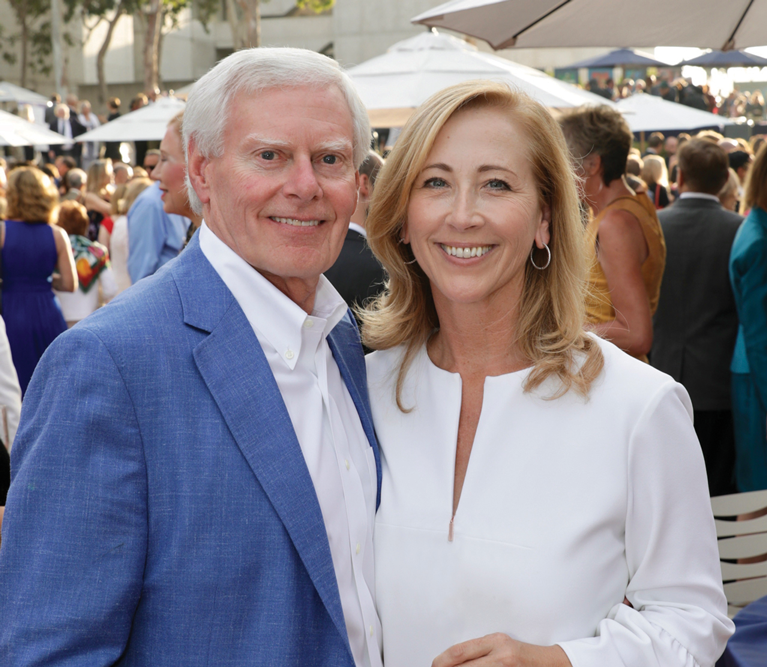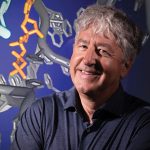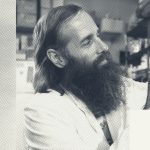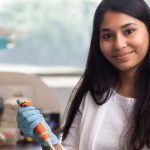Gratitude Thank you to our generous supporters
Salk scientists receive $1.5 million from Sol Goldman Charitable Trust to research multiple sclerosis treatments
Professor Ronald Evans and an interdisciplinary group of Salk Institute researchers were awarded a two-year, $1.5 million grant from the Sol Goldman Charitable Trust at the direction of cardiologist and Salk Trustee Benjamin Lewis. The award will fund a research project to explore connections between the gut, brain, and immune system in search of new therapies for patients with multiple sclerosis (MS).
MS is a common chronic inflammatory, demyelinating, and neurodegenerative disease of the central nervous system, impacting the brain, spinal cord, and optic nerves. While the exact cause of MS is unknown, the disease affects nearly 1 million Americans and an estimated 2.8 million individuals worldwide.
The grant will allow four Salk labs to explore the link between gut health and the mechanisms underlying autoimmune diseases, such as MS. The Salk researchers will partner with the Mayo Clinic and Johns Hopkins University to identify pathways, cells, and biological systems that can transform new discoveries and technologies in MS into new therapeutics for patients.
“We are incredibly grateful to Ben for facilitating this exciting research project into a reality,” says Salk President Rusty Gage. “While we have many things still to learn about multiple sclerosis, the researchers included in this venture will be building on the great strides they’ve made in their previous work of understanding this disease, which shows promise for future discoveries.”
Lewis was appointed to the Salk Board in 2010. In 2013, his name was added to a faculty chair in neuroscience, held by Professor Samuel Pfaff.
“The Sol Goldman Trust has a long history of supporting medical research with academic affiliations. Looking for an opportunity to make a difference in finding new discoveries, this project stood out,” Lewis says. “Salk is clearly at the forefront of neuroscience research, and the family extended our support to the Institute with the hope that researchers are able to find the next breakthrough with MS.”
The research project will be broken up into four consecutive studies headed by four Salk labs. Evans will oversee the project and investigate the role bile acids play in MS, as well as explore how special formulations of vitamin D might block disease progression; Associate Professor Ye Zheng will look at the potential to treat MS using modified mRNA vaccine technology; Associate Professor Axel Nimmerjahn will study whether it is possible to control the inflammatory response in MS through glial cells; and Professor Susan Kaech will test whether blocking the hypoxia-inflammation cycle in MS will lead to effective new treatments. The hypoxia-inflammation cycle is a condition in which low oxygen levels (hypoxia) increase inflammation, and inflammation in turn triggers hypoxia. The cycle is thought to play a role in MS progression.
Collectively, the team will undertake a multidisciplinary approach to understanding the association between hypoxia, loss of healthy gut regulation, and MS. The team also hopes to successfully attract additional support from government and private philanthropy.
“The Salk team is exploring new therapeutics that bypass complications from diet and sun exposure to produce a totally novel approach to quench neuronal inflammation to ease and potentially erase MS pathology,” says Evans, director of the Gene Expression Laboratory and holder of the March of Dimes Chair in Molecular and Developmental Biology. “With novel molecular, genetic, immunologic, and neuroimaging technologies, we aim to transform our new discoveries and technologies into new therapeutics for patients.”
“Salk is clearly at the forefront of neuroscience research, and the family extended our support to the Institute with the hope that researchers are able to find the next breakthrough with MS.”
-Benjamin Lewis, Salk Trustee
The Jay and Sarah Flatley Foundation gives $1.25 million to Salk’s neuroscience research and campus expansion

From left: Jay and Sarah Flatley.
The Salk Institute will receive a total of $1.25 million for neuroscience research and the new Joan and Irwin Jacobs Science and Technology Center, thanks to two generous gifts from the Jay and Sarah Flatley Foundation.
“We are delighted by the support the Flatley Foundation and Jay have shown the Institute over many years, and most recently with these two gifts,” says Salk President and Professor Rusty Gage. “Their generosity will go a long way in helping us reach the goals of Salk’s fundraising Campaign and strengthening our scientific efforts moving forward.”
Salk’s Campaign for Discovery was launched in 2019 with the aim of attracting the people and building the technology and space necessary to accelerate research in six critical areas: neuroscience, cancer, aging, plant biology, immunobiology, and computational biology. As part of the Campaign, the Institute plans to build the new Jacobs Center on the east side of campus. The 100,000-square-foot facility will provide much-needed research and administrative space to advance and expand the Institute’s scientific mission, in keeping with founder Jonas Salk’s vision of flexible and functional design that enables collaboration and exploration.
Construction of the Jacobs Center will also allow for the reallocation of space in Salk’s current facilities and creation of a Center of Excellence for Neuroscience. Neuroscience research has long been a strength at Salk, giving rise to fundamental discoveries in brain development, movement, sensation, learning, memory, and neurodegenerative diseases. Salk scientists are now studying how some brains adapt well to the myriad of daily stresses that can challenge our mental health and how other brains don’t, and what tips the balance between acute and chronic mental health issues.
Empowered by the Flatley Foundation gift and the Campaign for Discovery, the Center of Excellence will co-locate and expand many Salk neuroscience labs, providing a “think tank” for cell biologists, geneticists, behavioral scientists, computational biologists, and other experts all tackling the same research questions from different perspectives with the goal of pursuing novel treatments and diagnostics.
Each of the two Flatley Foundation gifts is in the amount of $500,000. The donation toward the new building was matched by longtime Salk supporters Joan and Irwin Jacobs as part of the couple’s $2 to $1 grant challenge, increasing the Flatley Foundation’s building gift to $750,000, for a total donation of $1.25 million.
“Exciting things are happening at Salk, and our foundation saw a wonderful opportunity to help accelerate the future of scientific discovery at the Institute,” says Jay Flatley, a Salk Trustee and former CEO and Chairman of Illumina.
Featured Stories
 Journey of a lifetime—The Cancer Center at Salk celebrates 50 years of life-changing discoveriesSalk’s Cancer Center has become a powerhouse of critical discoveries that have led to treatments and remissions for patients. The Center’s mission is to make current generations the last to see cancer as anything other than a routine diagnosis.
Journey of a lifetime—The Cancer Center at Salk celebrates 50 years of life-changing discoveriesSalk’s Cancer Center has become a powerhouse of critical discoveries that have led to treatments and remissions for patients. The Center’s mission is to make current generations the last to see cancer as anything other than a routine diagnosis.  Introducing Salk’s newest president, Gerald JoyceJoyce, a pioneer in the field of test-tube evolution, succeeds Professor Rusty Gage, who will return to his lab following a transformative leadership tenure. Joyce assumed the role April 21, 2023.
Introducing Salk’s newest president, Gerald JoyceJoyce, a pioneer in the field of test-tube evolution, succeeds Professor Rusty Gage, who will return to his lab following a transformative leadership tenure. Joyce assumed the role April 21, 2023.  Reuben Shaw—Unexpected resultsIt’s not every day a young scientist gets a jaw-dropping result he knows no one will believe. But that’s exactly what happened to Professor Reuben Shaw 20 years ago, in the spring of 2003.
Reuben Shaw—Unexpected resultsIt’s not every day a young scientist gets a jaw-dropping result he knows no one will believe. But that’s exactly what happened to Professor Reuben Shaw 20 years ago, in the spring of 2003.
 Tony Hunter—How an animal virus discovery more than 40 years ago led to one of today’s most successful cancer drugsThe story behind how Hunter discovered the first kinase that phosphorylates the amino acid tyrosine. The finding led to the development of Gleevec, a medication that is now routinely used to treat chronic myelogenous leukemia (CML).
Tony Hunter—How an animal virus discovery more than 40 years ago led to one of today’s most successful cancer drugsThe story behind how Hunter discovered the first kinase that phosphorylates the amino acid tyrosine. The finding led to the development of Gleevec, a medication that is now routinely used to treat chronic myelogenous leukemia (CML). Charles Stevens—A beautiful mind, and a heart to matchA pioneer in neuroscience, Distinguished Professor Emeritus Charles F. Stevens died peacefully on October 21, 2022, at his home in San Diego. He was 88.
Charles Stevens—A beautiful mind, and a heart to matchA pioneer in neuroscience, Distinguished Professor Emeritus Charles F. Stevens died peacefully on October 21, 2022, at his home in San Diego. He was 88. Leona Flores—Rocking cancer researchFlores had studied the design of the Salk Institute as an architectural engineering student, but never did she imagine that she would be the executive director of the Institute’s Cancer Center years later.
Leona Flores—Rocking cancer researchFlores had studied the design of the Salk Institute as an architectural engineering student, but never did she imagine that she would be the executive director of the Institute’s Cancer Center years later. Payel Mondal—Cancer researcher by day, financial planner by nightMondal is a postdoctoral researcher in Assistant Professor Christina Towers’ lab where she studies the mechanisms involved in cancer progression. Her hope is that her projects will someday be translated into therapeutics to help people.
Payel Mondal—Cancer researcher by day, financial planner by nightMondal is a postdoctoral researcher in Assistant Professor Christina Towers’ lab where she studies the mechanisms involved in cancer progression. Her hope is that her projects will someday be translated into therapeutics to help people. Salk receives $1.5 million from the Sol Goldman Charitable Trust and $1.25 million from The Jay and Sarah Flatley FoundationThe Salk Institute is grateful to its many generous supporters.
Salk receives $1.5 million from the Sol Goldman Charitable Trust and $1.25 million from The Jay and Sarah Flatley FoundationThe Salk Institute is grateful to its many generous supporters.



















































